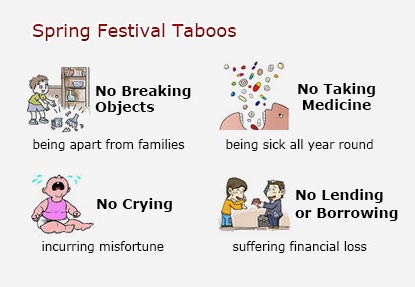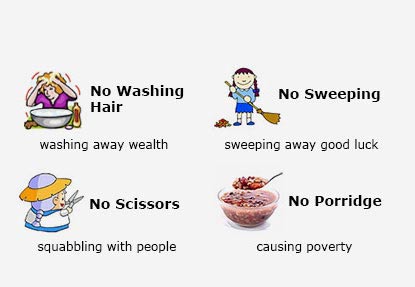Chinese People regard their right practice during Chinese New Year as an omen of luck for the coming year. Not only observing the festival by adhering to ancient rules, they would also try to avoid violating various taboos.
Some of those Chinese New Year taboos will only sustain for first few days of the festival, while others may be kept till the Lantern Festival on the 15th day of the 1st lunar month, or even for a whole month. Hereunder are 16 things you should never do during the Chinese New Year.

1. Taboo Words:
The first thing you should pay attention to is your words. Words with negative meaning should be avoided in daily conversation, such as breaking, running out, death, ghost, killing, sickness, pain, losing, and poverty. All these words should be replaced by euphemisms during the whole of Spring Festival.

2. Taking Medicine or Going to Hospital:
People should not take medicines, or see the doctor till the Lantern Festival; otherwise they may suffer from disease all the year round, and barely gain recovery. Although it is considered a practice of Chinese New Year superstitions, it is better to observe this tradition if you are not badly ill.

3. Breaking:
Never break a bowl, plate, glass, vase, or mirror, because breaking may result in money loss and family split in the future. If shattering one unheedingly, the fragments should be collected and wrapped by a red paper or cloth, and then littered on the fifth day of the New Year. Another remedy is to say, “Sui Sui Ping An,” which means safe and sound every year. The pronunciation of Chinese character Year (岁 Sui) and Broken (碎 Sui) are the same, so people use the homophones to expel bad luck.

4. Washing Clothes:
The first two days of the Chinese New Year are considered the birthday of the Water God. So, if you wash clothes during these two days, the god will be offended.

5. Sweeping and Dumping:
On the 1st day of the 1st lunar month, there is a Chinese New Year taboo on sweeping the house and dumping the trash. Otherwise, all the savings and valuables will be swept away. If it is really necessary, the house owner should start the sweeping from outside to inside of the house, which intimates collecting money. Besides, pouring water outside should also be avoided, as flowing water indicates movement of money; in this case, money leaving the home.

6. Crying:
It is believed that the cry of children forebodes disease and misfortune, which may bring bad luck to the whole family. Therefore, to avoid children’s crying during the festival, parents should not punish their kids, even if they make mistakes or are naughty.

7. Lending and Borrowing:
Do not lend or borrow anything on the first day of lunar January, especially money. Lending money is an unlucky omen, which means economical loss, so people should not offend friends or neighbors by borrowing something from them. Asking for return of debts owed is also a Chinese New Year taboo.

8. Married Daughter Returning Home:
If a woman gets married and lives apart with her husband's parents, she cannot visit her own parents on the first day of the New Year. Daughters are viewed as outsiders after they get married. If they return home on the first day, their parents would be stricken by poverty. Sometimes, parents live together with sons, and therefore the bad luck would also goes to women's brothers.

9. Needle Work:
In some Chinese New Year superstitions, women are not expected to do needle work during the festival, which may give rise to unnecessary squabbles and quarrels with family members or neighbors. Making shoes is also a definite don't, for that may bring evil home.

10. Using Scissors:
Just like doing needlework, using scissors is also an omen for possible quarrels with others. If you want to go through the year peacefully, it is a big ‘NO’ to use the scissors during the first lunar month.

11. Getting a Haircut:
People should not get their hair cut during the first lunar month, for it indicates the death of their uncle (mother's brother), and of course it is a thing you should never do during the Chinese New Year. Although it sounds absurd, people are glad to abide by this tradition.

12. Porridge as Breakfast:
Porridge is a taboo for breakfast on the first day’s morning. In the past, poor people could only afford rice porridge, so porridge reflects a down and out life. People usually eat dumplings as the first meal of the New Year.

13. Empty Rice Barrel:
The rice jar indicates people’s living standards. If it gets empty, there may be some days of starvation waiting for them in the near future. So filling the rice jar to the brim before the New Year’s Eve, is a means to attract a healthy financial situation.

14. Wakening Up Call:
People should not awaken others who are asleep on the first day of Spring Festival; otherwise, the one wakened up would be urged to do their work all the year around, exhausted and nervous.

15. Taking Afternoon Nap:
It is believed that people would become lazy all the year around if they take an afternoon nap on the first day of the Spring Festival. Besides, when there are visitors on that day, it is impolite if the host is sleeping.

16. Dressing in Rags or Wearing in Black and White:
Wearing new clothes means a brand new start, so ragged or dirty dressing symbolizes poverty and misfortune, and should be avoided. Besides, dressing in black and white is only applicable to woefully dour occasions like funerals and mourning ceremonies. Therefore, it is inappropriate to wear black or white clothes during the festival.
- Last updated on Feb. 18, 2024 by Catherine He -

















